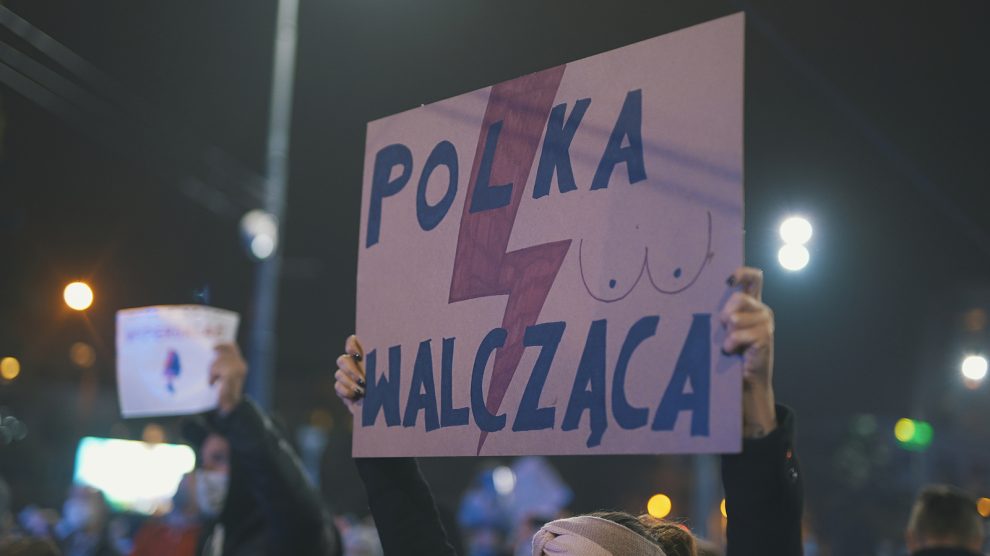A month before Poland votes in an already divisive election, a major human rights group suggests that the country’s government is carrying out a ‘ruthless pursuit’ of people trying to get or provide abortions.
Poland’s government is targeting people for alleged abortion-related activities, intensifying a climate of fear that heightens risks for women and girls, Human Rights Watch (HRW) has revealed, just a month before the country votes in a parliamentary election, with the country’s opposition pledging to introduce safe and legal abortion.
Human Rights Watch says that since a near-ban on legal abortion was introduced in 2020, Polish officials have increasingly opened investigations on questionable legal grounds against women and girls seeking medical care for miscarriages or after legal medication abortions, as well as against doctors.
- Economy in focus: Poland
- Migration, privatisation referenda set Poland on course for divisive election campaign
- Without the EU, Poland would be a much poorer place
Polish law does not criminalise having an abortion but rather anyone who provides or assists someone in having an abortion outside of highly restricted grounds. The government is apparently attempting to find a basis for prosecuting family members, friends, and healthcare providers for illegally providing or assisting abortions.
Ahead of a parliamentary election on October 15, Poland’s main opposition party, Civic Coalition, has pledged to make abortion up to the 12th week of pregnancy “legal, safe and available.”
HRW’s revelations, as well as public anger about Poland’s tough curbs on abortion could push the issue up the campaign agenda. Civic Coalition’s leader, Donald Tusk, a former prime minister and president of the European Council, earlier this year said that women’s rights were “the number one issue in Poland”.
However, in August the Coalition removed a candidate from its electoral lists after she called for allowing abortion at any stage of pregnancy.
PiS continues to lead in opinions polls, with support of around 35 per cent, ahead of the Civic Coalition on 27-28 per cent.
Witch hunt
According to Hillary Margolis, senior women’s rights researcher at Human Rights Watch, the Polish authorities’ ruthless pursuit of people trying to get or provide basic health care can only be described as a “witch hunt”.
“The government is misusing police and courts to advance its anti-rights agenda, taking its abusive policies into private homes, hospital rooms, and doctors’ offices,” she says.
In interviews with the human rights group, doctors, lawyers, and a woman who had a legal medication abortion described sweeping and speculative investigations, and overbroad searches. HRW says that criminalising those who provide or assist an abortion unjustifiably interferes with the right to health, leading to negative health outcomes and potential persecution of those seeking abortion.
Additionally, since January 2021, at least six women are known to have died after doctors did not terminate their pregnancies despite complications that posed a danger to their health or lives, which remain legal grounds for abortion in Poland. Prosecutors opened investigations into all six cases, five of which are ongoing. In the sixth, the prosecutor discontinued the proceedings without providing reasons for doing so.
Intense scrutiny
Women and girls have been put under intense scrutiny for alleged abortion-related activity when they seek urgent health care. Joanna, a 32-year-old woman, told HRW that the police demanded to strip search her in April after she had a self-administered medication abortion, which is legal.
Two weeks later, she called her psychiatrist for help with symptoms of severe anxiety. During the call, she disclosed her abortion to her psychiatrist, who called an ambulance and contacted the police. Police arrived at Joanna’s apartment alongside a paramedic and escorted her to two different hospitals. At the second one, she was ordered to undress for what amounted to a body cavity search.
“They told me to take off my clothes, do squats, and cough,” Joanna said. “I was just standing in front of them, I didn’t take my underwear off…. I tried to take a step back but there was only a wall behind me. I felt I wasn’t a human being anymore.”
The lawyer representing Joanna and others subject to invasive searches and interrogation said that such “fishing expeditions” do not have sufficient legal basis. “This is just searching for searching’s sake,” the lawyer said. “It’s not legitimate because the investigation must not be started without grounds for suspicion…. Only for abortion is it done this way.” These actions also constitute degrading treatment in violation of international human rights law, Human Rights Watch said.
A sustained government attack
Cases that Human Rights Watch documented offer evidence that Polish law enforcement authorities have increased their pursuit of women, girls, and healthcare providers since the politically compromised Constitutional Tribunal issued a decision in October 2020 that virtually eliminated legal abortion in Poland.
The decision, which entered into force on January 27, 2021, removed one of only three grounds on which an abortion could be obtained.
Evidence consistently demonstrates that laws criminalising or restricting access to abortion do not eliminate it, but rather drive people to seek abortion through means that may put their mental and physical health at risk and diminish their autonomy and dignity.
Since the Law and Justice party (PiS) took office in 2015, Poland’s government has carried out a sustained attack on sexual and reproductive health rights, particularly access to abortion. The ruling party brought the abortion case to the Constitutional Tribunal after parliament voted not to adopt legislation effectively banning legal abortion.
Unlike many news and information platforms, Emerging Europe is free to read, and always will be. There is no paywall here. We are independent, not affiliated with nor representing any political party or business organisation. We want the very best for emerging Europe, nothing more, nothing less. Your support will help us continue to spread the word about this amazing region.
You can contribute here. Thank you.


